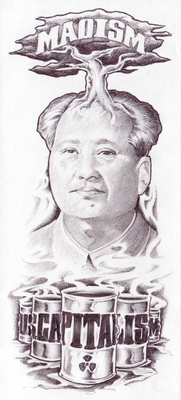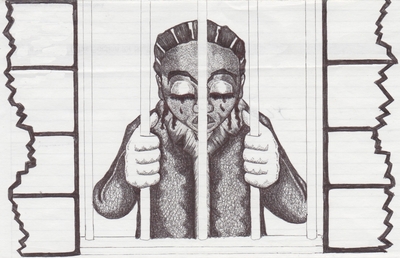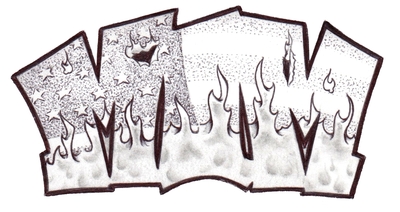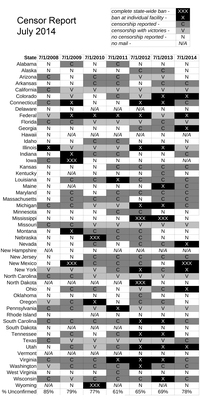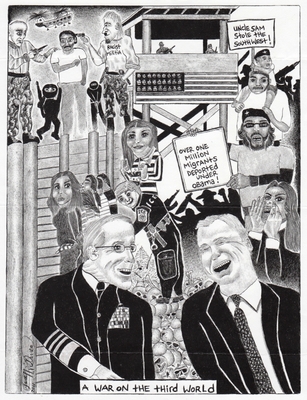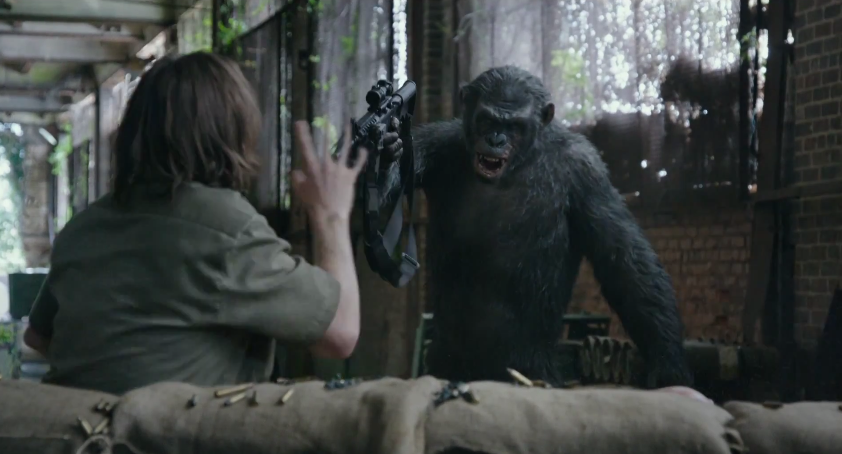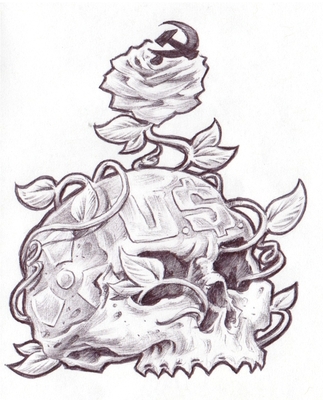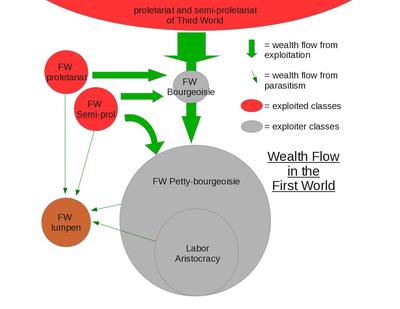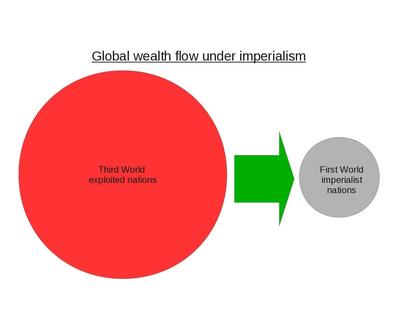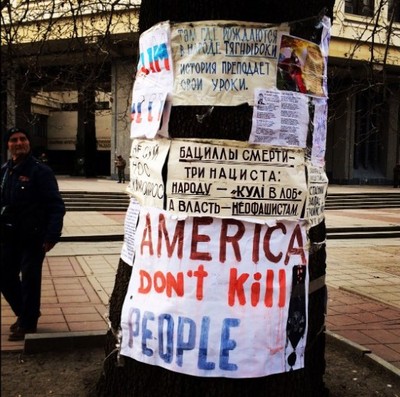
Capitalists Can't Save the Planet
In recent months it is becoming more common to read news stories about the irreversible collapse of glaciers in Antartica and elsewhere around the world, as a result of the rising temperature on earth. This degradation of our global environment is driven by humyn emissions of greenhouse gasses. As the reality of humyn destruction of Earth’s natural systems becomes more apparent daily, and scientists provide more clear and alarming evidence that we are at a point where the effects cannot be reversed, we see a compelling case for communism as the only economic system that has a chance of providing for the long-term survival of humyns.
Maoists focus on combating the repression and brutality of humyns against other humyns, which is an inherent element of capitalism. When it comes to fighting for the survival of the most oppressed humyns in the world, fighting for the life of the planet on which we all live has become inextricably intertwined with our humynism. Without an environment that can sustain humyn life, the fight against oppression of groups of people becomes irrelevant. We see a strong reason for communists to take up revolutionary environmentalism, and for unity between environmental activists and those fighting oppression of people. But we will not win the fight for the environment without first liberating the world’s oppressed people and overthrowing imperialism.
Back in 1997 MIM published the MIM Theory magazine entitled “Environment, Society, Revolution.” In it they wrote: “Our fundamental goal is eradicating the oppression of people over people, and this goal is also the most effective way to liberate the environment from human aggression. We do not believe that socialism necessarily achieves environmental salvation, but we do argue that only through socialism do we have a chance at it.”(1)
Historically the worst devastation has been wreaked on the environment as a result of oppression among people: wars, mass production using exploited labor, and corporate land seizure. In war, herbicides and chemical agents are used to deforest land and destroy crop production, which have severe, longlasting impacts on not only the plants, but the people and wildlife as well. Agent Orange, depleted uranium, napalm, and white phosphorous are examples of this type of warfare. A bomb that targets an “enemy” also destroys the environment in the surrounding area. Capitalist production allows for the practically unregulated dumping of waste into our rivers and oceans, including oil spills. When commodities cannot be sold, they are literally dumped into the ocean or incinerated, impacting ocean life and polluting the air.
Further, the imperialists target the Third World with imperialist-country waste, locating dirty industries there and dumping toxic waste in other people’s backyards.(1) And it is clear that the countries that contribute least to climate change will be impacted the most by it. Typhoons hitting Southeast Asia and India, droughts in Africa, and islands that will soon disappear to rising sea levels are all consequences that have already taken the lives of many people and threaten to destroy even more. Where the imperialist countries will be able to rebuild infrastructure and defend against the impacts of climate change more easily due to their stolen wealth, residents in the Third World do not have this privilege. At the same time, pollution and other effects of humyn activities have reached a scale where it is harder for the oppressor nations to isolate themselves from these problems. For this reason, environmentalism may prove to be the most powerful material force for building true internationalism.
In the United $tates the capitalists are attempting small reforms to address the growing environmental problem, but these attempts show us clearly why capitalism will fail to save the humyn race. The Environmental Protection Agency (EPA) recently proposed regulation of power plant emissions, focusing on existing coal plants. In slow-moving capitalism, the EPA will finalize their proposal some time in 2015, give states a year to figure out how to implement the new regulations, fight the lawsuits that states are threatening, and maybe see a few small changes many years down the road. The EPA optimistically predicts the proposal could cut carbon dioxide emissions from these plants by up to 30% by 2030.(2) The corporate media is already complaining about emissions standards being “bad for business,” which under capitalism is more important than humyn lives. And in true capitalist fashion, there is talk of paying off the coal companies and compensating people who have good high-paying union jobs that will be affected.(3) So for the sake of the rich capitalists and the well-off First World workers, there will be years of fighting over the possibility of making some small changes, while people in the Third World are dying today from climate change effects already happening.
Many well-meaning people think they can address environmental problems with individualist solutions. They suggest that everyone needs to recycle and drive electric cars, or perhaps not eat meat. It is true that Amerikan diets, car culture and wasteful production must all be dramatically changed in an ecologically sustainable system. But such lifestyle politics are moving even slower than capitalist reforms in terms of actually reducing the rates of pollution, resource depletion and natural systems disruption. Social movement must be backed by organization, structural changes and real power. The capitalists have all these things, but lack the motivation for change. Setting up independent institutions that actually change our systems of production and consumption to be in line with the rest of the natural world needs to happen. Whether this can be done prior to the seizure of state power is something for revolutionary ecologists to explore. We do know that the joint dictatorship of the proletariat of the oppressed nations will be necessary to eventually enforce the changes needed at a global scale. This is necessary because a significant portion of the oppressor nations will not willingly reduce their consumption, and as long as there is the potential to profit via short-sighted ecological practices, there will be people who will try to do so. In the United $tates today the forces which maintain the status quo are more organized than the forces to impose sound ecological practices.
A third common approach to environmental problems is the pure technology approach. While the science of ecology has advanced in recent decades, it has been limited by the social structure enforced by capitalism. First Worlders can build careers around working with small communities to solve local problems, but these band-aids cannot heal the wound when the knife of capitalist profiteering continues to twist and turn inside it. Such academic ecologists can contribute to our knowledge, but their efforts do nothing to challenge the capitalist model itself. It is far more efficient and effective to make changes necessary for the survival of humynity with centralized government acting in the interests of the majority, rather than through the NGO or non-profit sector, or even via the direct action method favored by anarchist camps. Communism unleashes the creativity of all the masses in a way that pushes these projects forward with immeasurable enthusiasm and breadth. (see our discussion of China: Science Walks on Two Legs in our review of revolutionaryecology.com) We encourage ecologists with global perspective to develop a strategy that will really make use of their work globally, and we advocate communism as the best way to accomplish their worthwhile goals. In the United $tates today, we have far more lifestylists and reformists in the environmentalist camp. We need more revolutionaries.
Socialism will put an end to “efficient” capitalist methods of making
profits. And with the land in the hands of the people, we can start to
make smarter decisions about balanced use for humyn survival without
environmental destruction. The majority of the world’s people do have an
interest in living on a healthy planet, but the capitalists with the
money and power are focused on profit. Since they have the power and the
guns, they do not have to answer to the majority. They waste resources
or even destroy them, if it serves their competitive interests. And they
do not care who or what dies in the process. Under capitalism we see how
government agencies and the government itself are beholden to the
wealthiest special interests, and incapable of implementing even modest
reforms. Only by overthrowing the capitalists and enforcing policies
that ensure the survival of humyns on Earth do we stand a chance of
reversing the destruction of the environment.
Related Articles:







